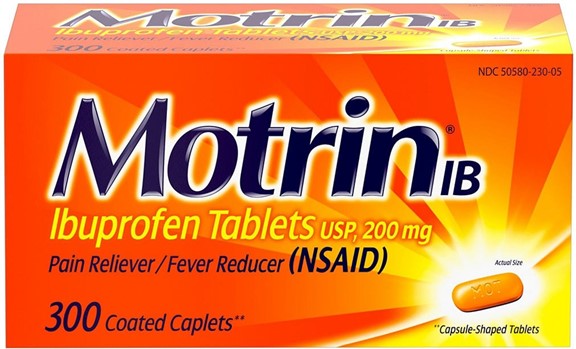A nurse is reviewing a medication reconciliation for an 80-year-old client with renal disease. Which medication should the nurse be most concerned about?
Digoxin.
Levothyroxine.
Motrin.
Tylenol.
The Correct Answer is C

Motrin is a brand name for ibuprofen, which is a nonsteroidal anti-inflammatory drug (NSAID). NSAIDs can cause renal toxicity, especially in older adults and patients with renal disease.
Therefore, the nurse should be most concerned about this medication and its potential adverse effects on the patient’s kidney function.
Choice A is wrong because digoxin is a cardiac glycoside that is used to treat heart failure and atrial fibrillation. Digoxin has a narrow therapeutic index and can cause toxicity if the dose is too high or if the patient has hypokalemia. However, digoxin does not directly affect the kidneys and can be safely used in patients with renal disease if the dose is adjusted according to the patient’s creatinine clearance.
Choice B is wrong because levothyroxine is a synthetic thyroid hormone that is used to treat hypothyroidism. Levothyroxine does not have any major interactions with the kidneys and can be used in patients with renal disease without dose adjustment.
Choice D is wrong because Tylenol is a brand name for acetaminophen, which is an analgesic and antipyretic drug. Acetaminophen does not have any anti-inflammatory effects and does not affect the kidneys at therapeutic doses. However, acetaminophen can cause hepatotoxicity if the dose exceeds 4 g per day or if the patient has liver disease or alcohol abuse.
Nursing Test Bank
Naxlex Comprehensive Predictor Exams
Related Questions
Correct Answer is A
Explanation
A client who grimaces during a dressing change is showing a nonverbal sign of pain. Grimacing is an expression of facial muscles that indicates discomfort or distress.
The nurse should record this as a symptom of pain and ask the client to rate the pain using a numeric or visual scale.
Choice B is wrong because an elevated heart rate while exercising is not necessarily a symptom of pain. It could be a normal response to increased physical activity or a sign of other conditions such as anxiety, dehydration, or fever.
Choice C is wrong because crying during a procedure is not a reliable indicator of pain. Crying is an emotional response that can be influenced by many factors such as fear, stress, or sadness.
The nurse should not assume that the client is in pain based on crying alone and should ask the client about the reason for crying and the level of pain.
Choice D is wrong because saying “I feel achy all over” is not a specific description of pain.
Aching is a vague term that can refer to different sensations such as soreness, stiffness, or cramping.
The nurse should ask the client to clarify what kind of pain they are feeling, where it is located, how severe it is, and what makes it better or worse.
Correct Answer is D
Explanation
Take this medication at least 30 minutes before ingesting any food or medication.
This is because alendronate (Fosamax) is a bisphosphonate that works by inhibiting the breakdown and reabsorption of bone. However, it has a very low bioavailability, which means that only a small amount of the drug is absorbed into the bloodstream when taken orally. Therefore, taking it with food or other medications can interfere with its absorption and reduce its effectiveness.
The other choices are wrong because:
A. Chew the tablet well and report any difficulty swallowing. This is wrong because alendronate tablets should not be chewed or crushed, but swallowed whole with a full glass of plain water. Chewing or crushing the tablets can increase the risk of irritation or damage to the esophagus (the tube that connects the mouth to the stomach). Difficulty swallowing is a possible side effect of alendronate and should be reported to the doctor, but it is not an instruction for taking the medication.
B. Take the medication with six to eight ounces of milk. This is wrong because milk contains calcium, which can bind to alendronate and prevent its absorption. Alendronate should not be taken with any beverages other than plain water.
C. Lie down for 15 to 30 minutes after taking the medication. This is wrong because lying down after taking alendronate can increase the risk of esophageal irritation or
ulceration. Alendronate should be taken in the morning, at least 30 minutes before eating or drinking anything, and the person should remain upright (sitting or standing) for at least 30 minutes after taking it.
Normal ranges for bone density are expressed as T-scores, which compare a person’s bone density to that of a healthy young adult of the same sex. A T-score of -1.0 or above is normal, a T-score between -1.0 and -2.5 indicates low bone density (osteopenia), and a T-score of -2.5 or below indicates osteoporosis.
Whether you are a student looking to ace your exams or a practicing nurse seeking to enhance your expertise , our nursing education contents will empower you with the confidence and competence to make a difference in the lives of patients and become a respected leader in the healthcare field.
Visit Naxlex, invest in your future and unlock endless possibilities with our unparalleled nursing education contents today
Report Wrong Answer on the Current Question
Do you disagree with the answer? If yes, what is your expected answer? Explain.
Kindly be descriptive with the issue you are facing.
